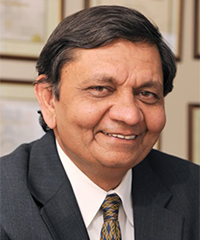Psychiatry
Major Depressive Disorder
Cognitive Dysfunction in Depression: Targeting the Gap
Overview
There is growing recognition that cognitive dysfunction in major depressive disorder (MDD) has been relatively overlooked by clinicians, academic researchers, and industry. Cognitive dysfunction may be present even in the first episode of MDD, and it may persist even after other symptoms of depression have abated. Studies with available antidepressants have generally shown only small beneficial effects on certain aspects of cognition, such as verbal and visual memory, while other aspects of cognition, such as processing speed, may sometimes actually worsen with treatment. What do these revelations mean for the overarching goal of restoring psychosocial function and occupational function in patients with MDD? Here, expert panelists consider this question in detail.
Q: What is the importance of cognitive symptoms in psychosocial function and workplace performance?
Ira D. Glick, MD
|
|
With cognitive changes in MDD, one can’t think clearly, one can’t process, and one can’t organize his or her thoughts adequately. Given the whole constellation of symptoms, the person with MDD doesn’t feel like getting out, and doesn’t enjoy getting out if he or she does. Depression impairs social function and workplace productivity.
Roger McIntyre, MD
|
|
“Over the last 3 to 5 years, I’ve been quite struck by the data from various studies showing that, across the panoply of depressive symptoms, cognitive symptoms may disproportionately account for impairments in work productivity and attendance.”
Agreed, and I think very relevant here is Dr Trivedi’s work with the STAR*D (Sequenced Treatment Alternatives to Relieve Depression) data set, and the CO-MED (Combining Medications to Enhance Depression Outcomes) trial. The paper that he and his team published dealt with the probability of improvements in work measures and productivity measures as functions of failed initial treatment. Frankly, I thought that paper really resonated on so many levels, and it’s very pertinent here.
As for me, the question has always been: what is it that mediates and moderates psychosocial outcomes? I have a particular interest in the workplace, and we know from the extant literature that functional outcomes for depression just haven’t been sufficient in the workplace. This challenge clearly has implications on so many levels. Over the last 3 to 5 years, I’ve been quite struck by the data from various studies showing that, across the panoply of depressive symptoms, cognitive symptoms may disproportionately account for impairments in work productivity and attendance.
I don’t think this comes as a surprise to anyone, given the requirements in the workplace today for cognitively demanding, complex, nonroutine skill sets. However, hitherto, cognitive symptoms have really not been extensively studied. So, as we attempt to reduce the burden of illness to individuals, families, and populations, I think addressing any dimension of cognition that is mediating these outcomes holds promise. It seems as though when it comes to workplace performance and workplace attendance among those with depression, the presence, severity, and maybe also the type of cognitive symptoms are particularly germane.
We published a paper a couple of years ago showing that, among individuals with depression who worked, the total depression symptom score accounted for relatively low variability in performance and attendance, while the cognition measures accounted for a very high proportion of variability in workplace performance. And, Dr Trivedi, I thought that your group’s paper was particularly thoughtful in that area.
Madhukar Trivedi, MD
|
|
Madhukar Trivedi, MD
|
|
“We need to really target the additional things such as cognition and the impact of these additional symptoms and impairments on a patient’s life, work productivity, and psychosocial function.”
“We need to really target the additional things such as cognition and the impact of these additional symptoms and impairments on a patient’s life, work productivity, and psychosocial function.”
I think you summarized it wonderfully, Dr McIntyre, and thank you. We now have a series of papers on work productivity, quality of life, and psychosocial functioning. We have not traditionally been paying enough attention to this area, nor have we included these parameters in our outcome assessments. We have now published about 9 papers that look at work productivity. In people who are not employed, we examine their daily activities, and we find impairments in these daily activities. Looking at psychosocial function, quality of life, social adjustment, all in different domains, there continues to be a proportion of patients who are better symptomatically but who are not yet fully recovered functionally.

We have traditionally focused on symptoms of depression, giving much less importance to cognition and the impact of depression, per se, on other things such as effects on work productivity, performance in other areas of life, and essentially psychosocial quality of life. Thus, some patients whom we define as having shown good responses to therapy have done so based on symptom rating scales like the Hamilton Rating Scale for Depression (HRSD) or the Montgomery-Åsberg Depression Rating Scale (MADRS), but these patients are not necessarily fully recovered.
I think we are dovetailing the same issue from 2 different angles: the issue of cognitive impairment and its impact on work productivity. For people who don’t have improvement of depressive symptoms, this translates to significant impairments that have an impact on the patient, family, employer, and society. Even in people who “get better” per symptom rating instruments, a large proportion of them will not have fully recovered cognitive function, work productivity, and psychosocial function. That gap, I feel, is a very important target for treatment. We need to really target the additional things such as cognition and the impact of these additional symptoms and impairments on a patient’s life, work productivity, and psychosocial function.
We should be thinking of something more, in addition to the impact that our traditional monoaminergic antidepressants like a selective serotonin reuptake inhibitor (SSRI) or a serotonin-norepinephrine reuptake inhibitor (SNRI) have had, because we find that patients on these therapies improve, but they are not back to normal. And maybe that is where there is a great need for additional treatment – whether it may be a medication to augment the effect, exercise, psychotherapy, magnetic stimulation, or whatever.
I completely agree with you, Dr McIntyre, about the problem of patients who have a range of depressive symptoms and additional impairments that persist after therapy with an SSRI or an SNRI. And so what are we to do with that? This is a very important area to be focused on in MDD. If you examine the definitions of remission, they do not necessarily include these impairments, and that is why I agree with you totally.
I think you summarized it wonderfully, Dr McIntyre, and thank you. We now have a series of papers on work productivity, quality of life, and psychosocial functioning. We have not traditionally been paying enough attention to this area, nor have we included these parameters in our outcome assessments. We have now published about 9 papers that look at work productivity. In people who are not employed, we examine their daily activities, and we find impairments in these daily activities. Looking at psychosocial function, quality of life, social adjustment, all in different domains, there continues to be a proportion of patients who are better symptomatically but who are not yet fully recovered functionally.

We have traditionally focused on symptoms of depression, giving much less importance to cognition and the impact of depression, per se, on other things such as effects on work productivity, performance in other areas of life, and essentially psychosocial quality of life. Thus, some patients whom we define as having shown good responses to therapy have done so based on symptom rating scales like the Hamilton Rating Scale for Depression (HRSD) or the Montgomery-Åsberg Depression Rating Scale (MADRS), but these patients are not necessarily fully recovered.
I think we are dovetailing the same issue from 2 different angles: the issue of cognitive impairment and its impact on work productivity. For people who don’t have improvement of depressive symptoms, this translates to significant impairments that have an impact on the patient, family, employer, and society. Even in people who “get better” per symptom rating instruments, a large proportion of them will not have fully recovered cognitive function, work productivity, and psychosocial function. That gap, I feel, is a very important target for treatment. We need to really target the additional things such as cognition and the impact of these additional symptoms and impairments on a patient’s life, work productivity, and psychosocial function.
We should be thinking of something more, in addition to the impact that our traditional monoaminergic antidepressants like a selective serotonin reuptake inhibitor (SSRI) or a serotonin-norepinephrine reuptake inhibitor (SNRI) have had, because we find that patients on these therapies improve, but they are not back to normal. And maybe that is where there is a great need for additional treatment – whether it may be a medication to augment the effect, exercise, psychotherapy, magnetic stimulation, or whatever.
I completely agree with you, Dr McIntyre, about the problem of patients who have a range of depressive symptoms and additional impairments that persist after therapy with an SSRI or an SNRI. And so what are we to do with that? This is a very important area to be focused on in MDD. If you examine the definitions of remission, they do not necessarily include these impairments, and that is why I agree with you totally.
Charles Debattista, MD
|
|
Charles Debattista, MD
|
|
“If one can’t think, regardless of whether one is the CEO of a major company or stacking boxes in a warehouse, it becomes very difficult to work.”
“If one can’t think, regardless of whether one is the CEO of a major company or stacking boxes in a warehouse, it becomes very difficult to work.”
I have had a particular interest in working with psychiatrically disabled patients, and I run the depression clinic at Stanford University. In this practice, we see many people who used to be high-functioning workers (eg, Silicon Valley executives) who have had 1 or more episodes of depression. With treatment, they may achieve significant improvements in their depressive symptoms, allowing for a return to work – but not necessarily at the same level of functioning as before.
In some instances, we have chief executive officers (CEOs) who cannot function as CEOs any longer after experiencing a significant period of depression or multiple recurrences. We know that depression is one of the leading causes of long-term disability in the developed world, and if anything, those rates seem to be increasing. If one can’t think, regardless of whether one is the CEO of a major company or stacking boxes in a warehouse, it becomes very difficult to work.
A big factor driving disability in patients with MDD (and, even partial disability, in the population that we work with) is cognitive impairment, which may certainly outlive the emotional aspects of the depressive episode. This can also be true for a person who returns to the workplace after responding to therapy but who does not perform at the same level as in the past.
In addition to the cognitive deficits, fatigue is probably the other driver for a lot of people who end up being disabled. It can be very hard to work if you can’t get out of bed. So, I think those 2 factors may be particularly critical in driving disability in our more severely depressed patients.
I have had a particular interest in working with psychiatrically disabled patients, and I run the depression clinic at Stanford University. In this practice, we see many people who used to be high-functioning workers (eg, Silicon Valley executives) who have had 1 or more episodes of depression. With treatment, they may achieve significant improvements in their depressive symptoms, allowing for a return to work – but not necessarily at the same level of functioning as before.
In some instances, we have chief executive officers (CEOs) who cannot function as CEOs any longer after experiencing a significant period of depression or multiple recurrences. We know that depression is one of the leading causes of long-term disability in the developed world, and if anything, those rates seem to be increasing. If one can’t think, regardless of whether one is the CEO of a major company or stacking boxes in a warehouse, it becomes very difficult to work.
A big factor driving disability in patients with MDD (and, even partial disability, in the population that we work with) is cognitive impairment, which may certainly outlive the emotional aspects of the depressive episode. This can also be true for a person who returns to the workplace after responding to therapy but who does not perform at the same level as in the past.
In addition to the cognitive deficits, fatigue is probably the other driver for a lot of people who end up being disabled. It can be very hard to work if you can’t get out of bed. So, I think those 2 factors may be particularly critical in driving disability in our more severely depressed patients.
References
Fava M, Rush AJ, Trivedi MH, et al. Background and rationale for the sequenced treatment alternatives to relieve depression (STAR*D) study. Psychiatr Clin N Am. 2003;26:457-494.
Greer TL, Grannemann BD, Chansard M, et al. Dose-dependent changes in cognitive function with exercise augmentation for major depression: results from the TREAD study. Eur Neuropsychopharmacol. 2015;25(2):248-256.
Jha MK, Greer TL, Grannemann BD, et al. Early normalization of quality of life predicts later remission in depression: findings from the CO-MED trial. J Affect Disord. 2016;206:17-22.
Jha MK, Minhajuddin A, Greer TL, et al. Early improvement in work productivity predicts future clinical course in depressed outpatients: findings from the CO-MED Trial. Am J Psychiatry. 2016;173(12):1196-1204.
Jha MK, Minhajuddin A, Greer TL, et al. Early improvement in psychosocial function predicts longer-term symptomatic remission in depressed patients. Aleksic B, ed. PLoS ONE. 2016;11(12):e0167901.
Jha MK, Teer RB, Minhajuddin A, Greer TL, Rush AJ, Trivedi MH. Daily activity level improvement with antidepressant medications predicts long-term clinical outcomes in outpatients with major depressive disorder. Neuropsychiatr Dis Treat. 2017;13:803-813.
McIntyre RS, Soczynska JZ, Woldeyohannes HO, et al. The impact of cognitive impairment on perceived workforce performance: results from the International Mood Disorders Collaborative Project. Compr Psychiatry. 2015;56:279-282.
Rush AJ, Trivedi MH, Wisniewski SR, et al. Acute and longer-term outcomes in depressed outpatients requiring one or several treatment steps: a STAR*D report. Am J Psychiatry. 2006;163(11):1905-1917.
Rush, AJ, Trivedi MH, Stewart JW, et al. Combining medications to enhance depression outcomes (CO-MED): acute and long-term outcomes of a single-blind randomized study. Am J Psychiatry 2011;168(7):689-701.
Trivedi MH, Greer TL. Cognitive dysfunction in unipolar depression: implications for treatment. J Affect Disord. 2014;152-154:19-27.
Trivedi MH, Morris DW, Wisniewski SR, et al. Increase in work productivity of depressed individuals with improvement in depressive symptom severity. Am J Psychiatry. 2013;170(6):633-641.
Trivedi MH, Dunner DL, Kornstein SG, et al. Psychosocial outcomes in patients with recurrent major depressive disorder during 2 years of maintenance treatment with venlafaxine extended release. J Affect Disord. 2010;126(3):420-429.
Trivedi MH, Rush AJ, Wisniewski SR, et al. Evaluation of outcomes with citalopram for depression using measurement-based care in STAR*D: implications for clinical practice. Am J Psychiatry. 2006;163(1):28-40.
References
Fava M, Rush AJ, Trivedi MH, et al. Background and rationale for the sequenced treatment alternatives to relieve depression (STAR*D) study. Psychiatr Clin N Am. 2003;26:457-494.
Greer TL, Grannemann BD, Chansard M, et al. Dose-dependent changes in cognitive function with exercise augmentation for major depression: results from the TREAD study. Eur Neuropsychopharmacol. 2015;25(2):248-256.
Jha MK, Greer TL, Grannemann BD, et al. Early normalization of quality of life predicts later remission in depression: findings from the CO-MED trial. J Affect Disord. 2016;206:17-22.
Jha MK, Minhajuddin A, Greer TL, et al. Early improvement in work productivity predicts future clinical course in depressed outpatients: findings from the CO-MED Trial. Am J Psychiatry. 2016;173(12):1196-1204.
Jha MK, Minhajuddin A, Greer TL, et al. Early improvement in psychosocial function predicts longer-term symptomatic remission in depressed patients. Aleksic B, ed. PLoS ONE. 2016;11(12):e0167901.
Jha MK, Teer RB, Minhajuddin A, Greer TL, Rush AJ, Trivedi MH. Daily activity level improvement with antidepressant medications predicts long-term clinical outcomes in outpatients with major depressive disorder. Neuropsychiatr Dis Treat. 2017;13:803-813.
McIntyre RS, Soczynska JZ, Woldeyohannes HO, et al. The impact of cognitive impairment on perceived workforce performance: results from the International Mood Disorders Collaborative Project. Compr Psychiatry. 2015;56:279-282.
Rush AJ, Trivedi MH, Wisniewski SR, et al. Acute and longer-term outcomes in depressed outpatients requiring one or several treatment steps: a STAR*D report. Am J Psychiatry. 2006;163(11):1905-1917.
Rush, AJ, Trivedi MH, Stewart JW, et al. Combining medications to enhance depression outcomes (CO-MED): acute and long-term outcomes of a single-blind randomized study. Am J Psychiatry 2011;168(7):689-701.
Trivedi MH, Greer TL. Cognitive dysfunction in unipolar depression: implications for treatment. J Affect Disord. 2014;152-154:19-27.
Trivedi MH, Morris DW, Wisniewski SR, et al. Increase in work productivity of depressed individuals with improvement in depressive symptom severity. Am J Psychiatry. 2013;170(6):633-641.
Trivedi MH, Dunner DL, Kornstein SG, et al. Psychosocial outcomes in patients with recurrent major depressive disorder during 2 years of maintenance treatment with venlafaxine extended release. J Affect Disord. 2010;126(3):420-429.
Trivedi MH, Rush AJ, Wisniewski SR, et al. Evaluation of outcomes with citalopram for depression using measurement-based care in STAR*D: implications for clinical practice. Am J Psychiatry. 2006;163(1):28-40.














